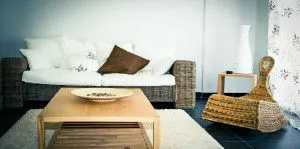Feng shui, which translates to “wind and water” in Chinese, is an age-old art form of placement and creating harmony between yourself and your environment. It is based on principles surrounding increasing positive energy flow and decreasing negative energy patterns.
The practice of feng shui is centered around organizing your space so that qi (also spelled chi), which loosely translates to “life force” or “vital energy,” has space to flow freely and harmoniously – and what better time to harmonize the energy of your home than spring cleaning time?
While feng shui can become quite intricate when you delve into the details, its basic principles are quite simple to follow, and can really transform your home into a sanctuary. Here are just a few ways to feng shui your home as you organize this spring:
When the weather gets warm enough, open your windows and let the spring breeze circulate through your home, clearing out all of the stagnant winter air.
Pay special attention to getting rid of clutter. Having areas of clutter in your home correlates with stress, and hanging onto the past. Get rid of anything that you don’t need, and pack away things that you need but do not use. Make your space as clear and unburdened by random ‘stuff’ as possible. Focus on countertops, coffee tables and nightstands, or anywhere else that things tend to pile up.
Clear any clutter around the front entrance to your home, as well as the entrances to rooms. According to Catherine Brophy, a feng shui practitioner and interior designer, the entrance to the home is the “mouth” of qi, and paying special attention to entryways allows qi to flow better throughout your entire home.
Keep living rooms and sitting rooms as clear as possible – make sure there is room to walk freely around. Do not block the middle of the room, as people need space to move about, and qi needs space to flow.
Arrange furniture in living areas in a fashion that is conducive to communication. If you have a square or rectangular coffee table, try not to have corners pointed at people. One principle of feng shui is to avoid furniture arrangements that can be reminiscent of danger, such as jutting edges or threatening-looking chandeliers.
In the bedroom, place your bed so it is on the opposite side of the room from the doorway, facing the doorway but not directly in front of it. If possible, do not keep anything under your bed; this interrupts qi flow.
Display art and items in your home that are meaningful to you and your family; put away or give away items and decorations that have no meaning or function.
In celebration of the coming summer, change up some of your home accents to bright, cool summer colors. Consider some flowering potted plants, and if you don’t already have one, set up an attractive fruit bowl in your kitchen, and keep it filled with fresh, seasonal fruits.
If you have an unsightly view from a window, placing a faceted crystal or a windchime in the window can change your perspective on it. According to Brophy, mirrors and reflective surfaces can disperse energy throughout your home.
When decorating, keep in mind that feng shui is all about balance. Traditional Chinese feng shui emphasizes a balance of the five elements, wood, water, earth, fire and metal, These elements can be represented in a variety of ways, such as with shapes or colors that remind you of each element.
Traditional feng shui also emphasizes the balance between yin and yang, the feminine and masculine forces. A harmony between circular and square shaped furniture, or contrasting colors, for example, can create this balance.

-The Alternative Daily
Sources:
http://www.fengshuivermont.com/pubart/three.html
http://www.tarot.com/feng-shui/organization
http://www.realsimple.com/home-organizing/decorating/what-feng-shui-00100000117187/index.html#1
http://www.feng-shui-institute.org/Feng_Shui/introduction.html
